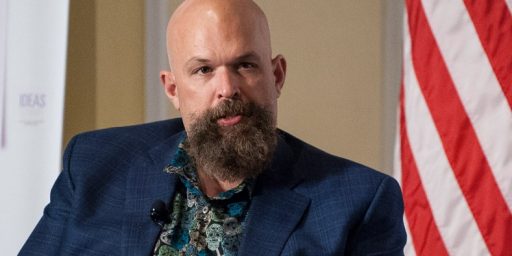Pseudo Experts
 Jonathan Chait contends that “Real budget wonks who circulate among genuine experts often fail to understand the degree to which the public debate is driven by pure hacks.” Further, “The same basic phenomenon can be seen is debates over climate change, supply-side economics, and other issues. You have a whole ideological movement that, to a substantial degree, relies upon the pseudo-expertise of cranks and hacks.” David Kurtz thinks these folks “give anti-Enlightenment conservatives a patina of intellectual legitimacy.”
Jonathan Chait contends that “Real budget wonks who circulate among genuine experts often fail to understand the degree to which the public debate is driven by pure hacks.” Further, “The same basic phenomenon can be seen is debates over climate change, supply-side economics, and other issues. You have a whole ideological movement that, to a substantial degree, relies upon the pseudo-expertise of cranks and hacks.” David Kurtz thinks these folks “give anti-Enlightenment conservatives a patina of intellectual legitimacy.”
Noah Millman makes an even broader claim, that somewhere along the way conservative intellectuals ceased to be intellectuals but rather advocates for Establishment views favored by funders. Kevin Drum isn’t so sure that this is a recent phenomenon.
I don’t think this is quite right. There are oodles of conservative intellectuals out there, whether on university campuses, the journalistic circuit, the blogs, or whathaveyou. But I’d agree that the Official House Organs of the Conservative Movement are increasingly orthodox and that the hacks seem to get most of the airtime.
Partly, I think, it’s a function of network effects. People who book shows are looking for people with recognizably conservative views, and the Official House Organs of the Conservative Movement are the obvious places to look. And not only is it hard to get hired at those places if you’re far outside the orthodoxy but your views are likely to more closely approach the orthodoxy if you’re surrounded by people steeped in it. (The reverse is also true: Conservatives or liberals surrounded by reasonable and friendly people of the opposite persuasion will naturally moderate their views over time.)
Partly, too, there’s a self-selection effect. As the house blogger (among other things) at the Atlantic Council, I frequently write about breaking topics in the foreign policy realm. Sometimes, it’s about something in which I’m expert or close enough to expert that I’ve got a strong opinion. Sometimes, it’s very important to our constituency that I have to get something up quickly (and thus don’t have time to solicit and wait for a genuine expert to write something) but sufficiently outside the scope of my interests or expertise that all I can do is aggregate the news and commentary that’s out there in a way that’s hopefully of use to the reader.
Quite frequently, I’ll be approached by the booker of a show to talk about one of these second types of posts. For example, last night, a major international network asked me to be a guest this morning to talk about the mess in Kyrgyzstan. I thanked them for their invitation and expressed interest in appearing again at some point in the future, but politely declined the offer — as I frequently do — on the basis that I simply don’t know the subject well enough. [UPDATE: I’ve now turned down a second request from another major international outlet. Sigh: They almost always approach me after one-off posts rather than things in my wheelhouse.]
I’ve watched enough news television and heard enough news radio to know that this stance is unusual. There are clearly people who will show up any time, anywhere, to talk about anything. But that pretty much defines a hack. Doing that reduces you to regurgitating a few talking points you’ve picked up and steering the conversation back to them.
But guess what? The incentive is to do precisely that. Producers love guests they can count on in a moment’s notice and whom they can comfortably pigeonhole ideologically. And talking points make for breezy sound bytes and conflict, whereas people like me tend to talk in paragraphs and shades of gray. Outside of a handful of longer form venues like NPR, that’s not what they’re looking for.
Photo credit: Blogtrepreneur






So the hacks are always wrong? And the statist elitists are always right?
I had to check the byline and make sure it wasn’t David Brooks or David Frum writing this. You seem to do a lot of hand wringing these days about the failures of those arguing against an ever growing Leviathan.
Or maybe I missed the subtle irony and your implying it is Mr. Chait and Mr. Millman who are the pseudo experts.
The problem is that the hacks aren’t doing anything useful. They’re just repeating talking points without much analysis of the current realities. That doesn’t make the other side right but it makes it a hell of a lot easier for them to win, since they’re actually doing the pick and shovel work.
Because I think failing in that argument is a bad thing. You don’t?
I admire the fact that you avoid the lure of TV when you don’t really know the subject. That would make you part of a tiny minority of pundits who are unwilling to pontificate on things they know nothing about.
I had a similar thing happen back when I was playing around with doing commercials for the DLCC. Some booker asked me to come on and rattle on about political media. I declined on the grounds that It was all just a goof for me, honestly, much more about trying to do something creative than about political impact one way or the other. I had come up with the notion while drinking in a Madrid bar with a wanna-be matador. I was pretty sure I wasn’t an expert.
Of course. Never mind.
The same thing happens on the financial and investment side. TV loves predictions, regardless of their accuracy. I believe Nassim Taleb was on a show once, explaining Fooled By Randomness (a book I did not read in college ;-), and that we cannot actually know the future. The hosts let him finish and then said “so what stocks can you recommend right now?” He kind of just stared at them.
Charles:
Can I ask what good it is without a good, pragmatic, plan? Or should I just accept that people tune in to see someone howl at the moon?
Which makes me a bad pundit!
I’m more willing to do it in the context of a personal blog. But even there I tend to disclaim.
Liberals and the government class love to portray themselves as having knowledge conservatives and the general public lack. It’s their easy way to discount whatever competing claims are made by the Right that contradict their own. It’s nonsense. The Left engages in using talking points as often as the Right. Neither side has monopoly on knowledge.
The new twist on the notion the Right has no real knowledge of the issues is the linking of whatever is said to Beck, Limbaugh, et al. Hardly any point can be without someone asking if that’s what you heard on the radio or TV. Once again we find the Left discounting ideas rather than directly engaging in debate on merits. How often do we see that here? Quite often.
We must also remember how many times the real experts have been terribly wrong or they have purposely misled the public. Paul Ehrlich is a poster child for leftist propagandist disguised as a real intellectual thinker. Prediction after prediction he makes from the ivory tower only to have the opposite come to pass. Yet he still sits in the tower with all the prestige and power. So we’re supposed to turn over our lives to people like Ehrlich?
Now I may be a rube and lack the knowledge of these experts yet I am just one of millions whose combined thinking power far outweighs the elite group of “real” experts. Whether it’s science or budgets there are enough of us out here who can put our heads together and formulate worthwhile ideas and policies. The exchange of knowledge through the internet is taking the establishment elite by surprise and they are lashing out.
Let me get this straight. Erlich, taking his side of the bet, thought he knew the future. But Simon, taking his side of the bet, did not?
As it happens, depending on the year you choose, sometimes Erlich wins and sometimes Simon does.
It might say more about “no one can know the future” than that conservatives have a lock on it.
BTW, the bet might also be based on a bit of a “money fallacy.” It is about “commodities’ prices in inflation-adjusted terms.” Think about that for a second. It chases its tail a bit doesn’t it? Commodities … part of inflation … adjusted for inflation?
Steve:
What a load of bull.
The average conservative civilian (non pundit) has no idea — as repeatedly demonstrated in polls — what the hell he is talking about. You’ve got a bunch of infantile loudmouths angrily demanding that 1) no taxes be raised, 2) and cuts be made — but only to tiny programs that have no significant bearing on the deficit.
The essential difference between liberals and conservatives is that liberals want programs and are willing to pay for them and conservatives want the same programs and are only willing to borrow from the Chinese to pay for them.
Actually, liberals want “the rich” to pay for them. I’m not sure why that’s a morally superior position.
Steve:
What a load of bull.
The average progressive civilian (non pundit) has no idea — as repeatedly demonstrated in polls (and almost every time they open their mouths) — what the hell he (sic — sexist pig) is talking about. You’ve got a bunch of infantile loudmouths angrily demanding that 1) no benefits be cut, 2) and new entitlements be added — because, um, because Keynes said that deficits don’t matter, and gosh darn it, people have needs.
The essential difference between progressives and conservatives is that progressives want programs and are willing to have someone else pay for them while imagining that conservatives want the same programs and are only willing to borrow from the Chinese to pay for them, whereas conservatives are violent racists who want people to suffer and die.
Oh, and Michael Reynolds is full of, well, you know.
James:
Even if we accept that liberals only want the rich to pay, it remains a morally superior position since, in the end, all debt must be paid for. We at least hope that someone will pay for it — and since liberals are as likely to be taxed as conservatives we include ourselves as payers.
Conservatives believe borrowing can go on forever and ever and ever and no one — not even the rich — should be asked to pay.
It’s the difference between trying to get your wealthy buddy to pick up a dinner check and simply pulling a dine and dash.
Charles:
1) Actually, I believe it was Karl Rove who said “deficits don’t matter.” And his president who acted on that assumption, following in the footsteps of Mr. Reagan.
It was Mr. Clinton who lowered the deficit, not a Republican.
2) It’s almost never a good idea to attack me on word choice. What with me earning a nice living doing nothing but putting words on paper. “He” is not sexist, it’s a linguistic convention. The only people who object to the use of the male pronoun are angry feminist caricatures left over from the 70’s.
3) We don’t imagine that conservatives want the same programs. Your spittle-flecked tea party friends never manage to get around to proposing cuts in Medicare or Social Security or Defense. All they want to cut is foreign aid, which is the budget equivalent of the loose change you find under the nation’s seat cushion.
The fiscal prudence of the GOP can best be likened to the chastity of Tiger Woods.
Let’s see, Rove was elected to what? That’s right, he wasn’t an elected leader. And those Clinton budgets came with the help of many Republicans in Congress.
I love the superiority exposed in the “spittle-flecked tea party friends” statement. That’s part of what I was speaking about. Demean your opponent to make them look less intelligent.
I have also noticed anti-Tea Party people love to bring up Social Security and Medicare. The Tea Party is focused on stopping further expansion of government. Conservatives are smart enough to know rolling back entitlements will be impossible. Is pragmatism verboten?
Too bad it wasn’t Rove, it was Cheney.
charles austin, you’re always complaining about how insulting liberals are about your views. Have you every looked at your own posts? You don’t seem to understand that somebody who disagrees with you may not be stupid, dishonest, or both.
I think your economic policies have been followed ever since the 1980 presidential election, and they’ve helped to bring about ever increasing inequality. Productivity has increased, and all of the gains have gone to the upper 5%. If you disagree, tell me why. But don’t just call me a dope or a liar.
“give anti-Enlightenment conservatives a patina of intellectual legitimacy.â€
I wonder if a liberal wrote this with a straight face. Modern liberalism has morphed into the world’s most effective anti-Enlightenment project.
Stan, just turning Michael Reynold’s tactics right back on him. I especially love when he tells me how much smarter he is than I am because, um, because he makes more money than I do I guess, and what a fascinating proposition that is, but I digress.
I’m quite certain “my” economic policies have not been followed since the 1980 presidential election, so I don’t know what you are talking about. My economic policies would include a greatly simplified tax code with a flat tax, vastly decreased spending on entitlement programs, tort reform, a renewed focus on liberty, deregulation of many areas, simplification of government paperwork, and a myriad of other things. Neither Republicans nor Democrats have signed on to any of those themes.
There is an increasing inequality in income, but that doesn’t bother me the way it bothers you because it is only part of the story. I disagree strongly with the statement that all the gains have gone to the upper 5%. I’m not in the upper 5% but the computers I use have vastly improved since my first Apple II+, the cars I drive are much more powerful, comfortable and fuel efficient, the health care I receive is vastly superior, some of the drugs I take now didn’t exist in 1980, my iPod didn’t exist in 1980, my cell phone capabilities and broadband access did not exist in 1980, etc., etc., etc. You can limit your argument to income levels if you choose, but that would seem to ignore many of the changes — driven by those productivity increases — that everyone benefits from regardless of their income levels.
And please note that not once did I call you or anyone else stupid.
Michael Reynolds, why do you think I give a damn about Karl Rove or defend him? When it comes to economic policy I didn’t like his boss very much, so I’m pretty sure I won’t like Karl Rove’s views either.
Deficits did come down when Bill Clinton was president, but to ignore the turnover of Congress in 1994 and what Andy Grove and the folks at Intel did, as well as a millions of others is to misunderstand why deficits fell. I give Bill Clinton a lot of credit for fighting for free markets, which very few of his Democratic collegues then or now support. That also helped spur the economy which raised revenue for the government and brought down the deficit. Bill Clinton also used Social Security taxes as general revenue, which helped bring down the deficit.
But giving Bill Clinton some credit for helping bring down the deficit isn’t the same thing as endorsing everything he did.
I think you need to differentiate between Republicans and conservatives. They aren’t usually the same thing.